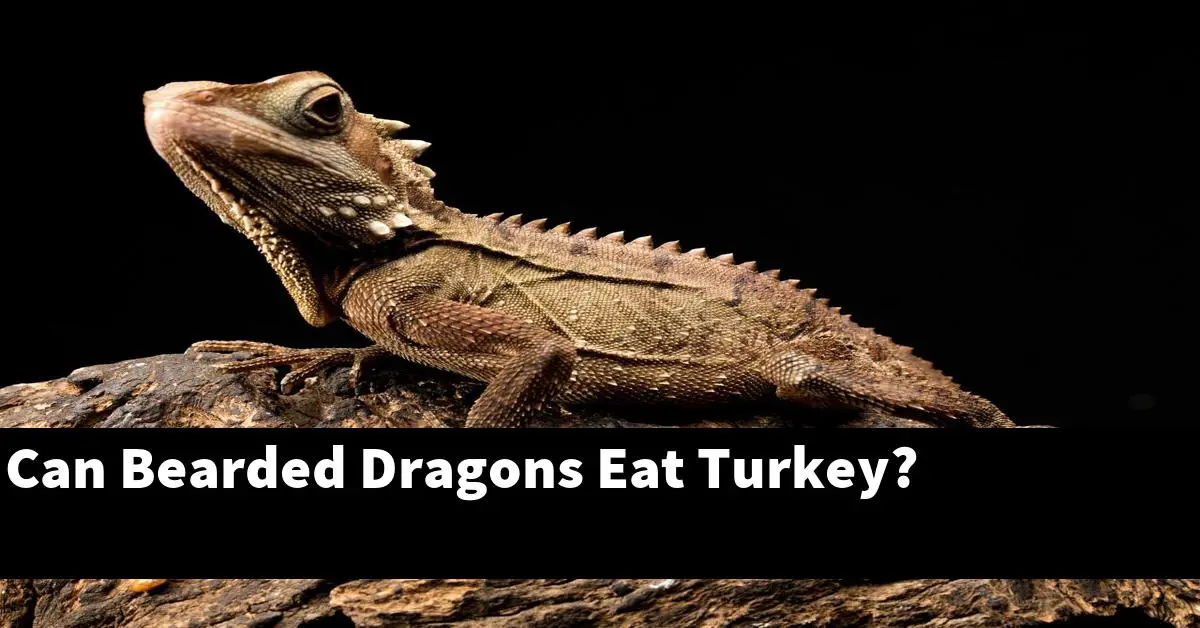Do bearded dragons really enjoy the taste of turkey? Some people say that they do, while others insist that their favorite reptile wouldn’t touch the stuff. If you’ve ever wondered whether or not your bearded dragon would enjoy a holiday feast, read on to find out more.
If you do choose to feed your bearded dragon turkey, it is important to do so in moderation and to avoid giving them any processed or fried turkey, as this can be harmful to their health.
The article will be discussing whether or not bearded dragons can eat turkey.
Table of Contents
What is the nutritional value of turkey for bearded dragons?
Bearded dragons are a type of lizard that is native to Australia. They are a popular pet due to their docile nature and their ability to be trained. Bearded dragons are omnivores, which means that they eat both plants and animals.
In the wild, their diet consists of insects, small mammals, and vegetables. In captivity, their diet is typically made up of commercially-prepared bearded dragon food, live insects, and vegetables.
Turkey is not a natural part of a bearded dragon’s diet. However, some people choose to feed their bearded dragons turkey as a treat. Turkey is a good source of protein, which is an essential nutrient for bearded dragons.
It also contains some other nutrients that can be beneficial for bearded dragons, such as vitamin A and phosphorus. However, turkey is also high in fat, which can be harmful to bearded dragons if they eat too much of it. Therefore, it is important to only feed turkey to bearded dragons in moderation.
What are the benefits of turkey for bearded dragons?
Turkey provides a number of benefits for bearded dragons.
- First, turkey is a good source of protein, which is essential for bearded dragon growth and development.
- Second, turkey is also a good source of essential amino acids, which are necessary for bearded dragon health.
- Third, turkey is a good source of essential fatty acids, which are necessary for bearded dragon health.
- Finally, turkey is a good source of vitamins and minerals, which are necessary for bearded dragon health.
Are there any risks associated with feeding turkey to bearded dragons?
Yes, there are certain risks associated with feeding turkey to bearded dragons. One of the biggest risks is the potential for Salmonella poisoning. Salmonella is a bacteria that can cause severe illness in both animals and humans.
If a bearded dragon comes into contact with contaminated turkey, they can become very ill. Symptoms of Salmonella poisoning include vomiting, diarrhea, lethargy, and fever. In severe cases, Salmonella poisoning can be fatal.
Another risk associated with feeding turkey to bearded dragons is the potential for choking. Bearded dragons have small throats and can easily choke on large pieces of turkey.
If a bearded dragon does choke on turkey, it is important to get them to a veterinarian immediately as they may need to be intubated.
Finally, another risk associated with feeding turkey to bearded dragons is the potential for gastrointestinal blockage.
Bearded dragons can easily swallow large pieces of turkey that can then get stuck in their gastrointestinal tract. If a blockage occurs, it can be life-threatening and will require veterinary care.
How should turkey be prepared for bearded dragons?
Turkey should be prepared for bearded dragons by cooking it thoroughly. Turkey should be cooked to an internal temperature of 165 degrees Fahrenheit to ensure that it is safe for your bearded dragon to eat.
When cooking turkey for your bearded dragon, you should also avoid using any spices or seasoning as these can be harmful to your reptile. Once the turkey is cooked, you can chop it into small pieces and offer it to your bearded dragon as part of a healthy and balanced diet.
Can bearded dragon eat cooked turkey?
There are a few things to consider when deciding whether to feed your bearded dragon cooked turkey.
First, cooked turkey is high in fat and may not be the best choice for a bearded dragon diet. Bearded dragons are typically fed a diet that is high in protein and low in fat.
Second, cooked turkey may not be as easily digestible as other proteins. This is because the cooking process can break down the proteins in the meat, making them more difficult for the bearded dragon to digest.
Third, cooked turkey may contain bacteria that could make your bearded dragon sick.
It is important to cook the meat properly to kill any bacteria that may be present.
Can bearded dragons eat other cooked chicken?
Bearded dragons are omnivorous, meaning they eat both plants and animals. In the wild, their diet consists of insects, small mammals, and reptiles.
In captivity, bearded dragons are often fed a diet of commercially-prepared reptile food, which includes both plant and animal matter. However, many people choose to supplement their bearded dragon’s diet with live insects or other fresh foods.
Cooked chicken is sometimes given to bearded dragons as a treat. While it is not a necessary part of their diet, cooked chicken can be a healthy addition. It is important to remember that chicken should only be given in small quantities and should not make up the majority of their diet.
What meats can bearded dragons eat?
There are a variety of meats that bearded dragons can eat, including crickets, worms, and other insects. However, they can also eat small mammals and reptiles.
The best diet for a bearded dragon includes a variety of proteins to ensure they get all the nutrients they need.
Summary
This is a common question that many new bearded dragon owners have. The answer is yes, bearded dragons can eat turkey.
Turkey is a good source of protein for bearded dragons and can be given to them as part of a well-rounded diet. When feeding turkey to your bearded dragon, be sure to cook it thoroughly and remove any bones before giving it to them.

